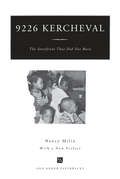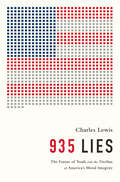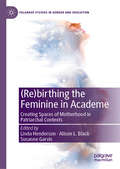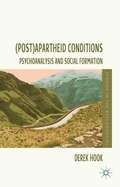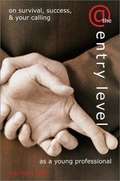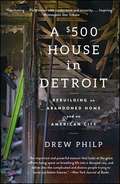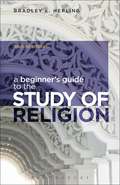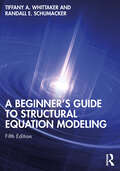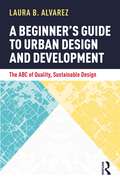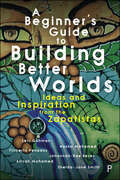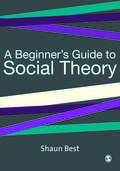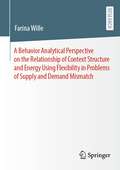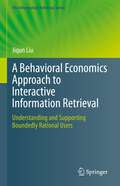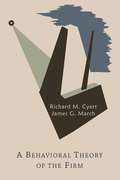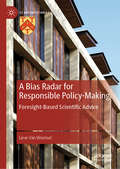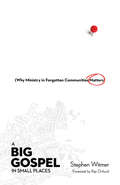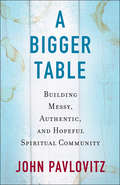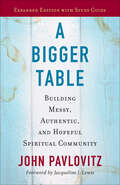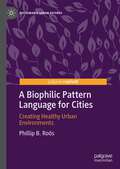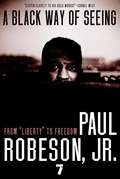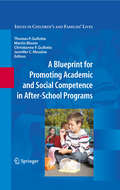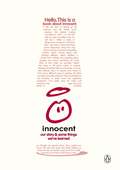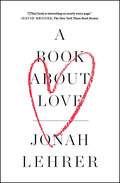- Table View
- List View
9226 Kercheval: The Storefront that Did Not Burn, With a New Preface (Ann Arbor Paperbacks)
by Nancy Milio"They make you feel like you're somebody..." The testimony of one black woman in Detroit's Lower Southeast Side ghetto, explaining what the storefront at 9226 Kercheval Street means to her. The storefront houses the Mom and Tots Neighborhood Center—a remarkable experiment in community health care, founded by a diminutive registered nurse named Nancy Milio and run by and for the people of the ghetto. This is the area that was literally burned down during the Detroit Riot of 1967. Not a proper location for a maternity and daycare center, according to many white professionals."These people ought to go away from their neighborhood so they can see how other people live... if we make it too easy for them, they'll never..."During the Riot, buildings on both sides of the Mom and Tots Center were fired and gutted. The Center was untouched. Why it was untouched is one of the implicit themes of 9226 Kercheval; as is the theme of struggle—struggle in the birth and development of a truly relevant health-care center, and struggle to define "health" in its broadest possible terms."Health is... opening, unfolding, from diffuseness towards coherence, simplicity toward complexity... toward wholeness."9226 Kercheval is both a documentary of how a new institution grew and a personal account of how a "social activist" was herself changed. It is the story—beautifully conceived and written—of the strengths of the so-called people of poverty. There is no other book like it.
935 Lies: The Future of Truth and the Decline of America's Moral Integrity
by Charles LewisFacts are and must be the coin of the realm in a democracy, for government OC of the people, by the people and for the people, OCO requires and assumes to some extent an informed citizenry. Unfortunately, for citizens in the United States and throughout the world, distinguishing between fact and fiction has always been a formidable challenge, often with real life and death consequences. But now it is more difficult and confusing than ever. The Internet Age makes comment indistinguishable from fact, and erodes authority. It is liberating but annihilating at the same time. For those wielding power, whether in the private or the public sector, the increasingly sophisticated control of information is regarded as utterly essential to achieving success. Internal information is severely limited, including calendars, memoranda, phone logs and emails. History is sculpted by its absence. Often those in power strictly control the flow of information, corroding and corrupting its content, of course, using newspapers, radio, television and other mass means of communication to carefully consolidate their authority and cover their crimes in a thick veneer of fervent racialism or nationalism. And always with the specter of some kind of imminent public threat, what Hannah Arendt called OCyobjective enemies. OCOOCO An epiphanic, public comment about the Bush OC war on terrorOCO years was made by an unidentified White House official revealing how information is managed and how the news media and the public itself are regarded by those in power: OC You journalists live] OC in what we call the reality-based community. But] thatOCOs not the way the world really works anymore. WeOCOre an empire now, and when we act, we create our own reality . . . weOCOre historyOCOs actors . . . and you, all of you, will be left to just study what we do. OCO And yet, as aggressive as the Republican Bush administration was in attempting to define reality, the subsequent, Democratic Obama administration may be more so. Into the battle for truth steps Charles Lewis, a pioneer of journalistic objectivity. His book looks at the various ways in which truth can be manipulated and distorted by governments, corporations, even lone individuals. He shows how truth is often distorted or diminished by delay: truth "in time" can save terrible erroneous choices. In part a history of communication in America, a cri de coeur for the principles and practice of objective reporting, and a journey into several notably labyrinths of deception, "935 Lies" is a valorous search for honesty in an age of casual, sometimes malevolent distortion of the facts.
: Creating Spaces of Motherhood in Patriarchal Contexts (Palgrave Studies in Gender and Education)
by Susanne Garvis Alison L. Black Linda HendersonThis book engages expansively with the concept of motherhood in academia, to offer insights into re-imagining a more responsive higher education. Written collaboratively as international, interdisciplinary and intergenerational collectives, the editors and contributors use various ways of understanding ‘motherhood’ to draw attention to – and disrupt – the masculine structures currently defining women’s lives and work in the academy. Shifting the focus from patriarchal understandings of academe, the narratives embrace and champion feminist and feminine scholarship. The book invites the reader to question what can be conceived when motherhood is imagined more expansively, through lenses traditionally silenced or made invisible. This pioneering volume will be of interest and value to feminist scholars, as well as those interested in disrupting patriarchal academic structures.
: Psychoanalysis and Social Formation (Studies in the Psychosocial)
by Derek Hook(Post)Apartheid Conditions.
@ The Entry Level: On Survival, Success, & Your Calling As A Young Professional
by Michael BallCash, Coercion, Cons, Whatever it takes to get unsuspecting grads to sign that offer letter, Corporate America is game. Because once it's finally plain that the entry level, in fact, is a hellish and demeaning place of grunt-work, brown-nosing, and mental drool, the ink's already dry and the newbies in bed. Way in, what with the pressure to keep post-college resumes stocked with "respectable" Fortune 500 firms. Instead, most early-stage workers end burying their dreams underneath their paycheck, suffering quietly through the frustration, depression, and thoughts of beating their manager with a stick. No more. @ The Entry Level is designed to lead you through the psychologies, philosophies, and strategies for succeeding in business' basement, but with the single-minded purpose of finding the work you were made to do. It's the first book ever to dispel the myths, whisper the tricks, and supply the tools to help you as a young professional: *Manage the transition from college to work *Negotiate the Entry Level Rite of Passage Navigate office politics and build your personal brand *Earn the promotion or transfer with the right fit *Locate a sturdy work - life balance *Uncover your values to make intelligent, healthy career decisions *Gain the courage to follow your passion and find your calling Further taking a hard look at the seduction of money, the silliness of company loyalty, and the side-effects of waiting until midlife to figure out what your job should mean, this is the indispensable guide for career freshmen seeking a deeper, richer working life. And for those who just need to keep breathing. Michael Ball is the founder and CEO of Career Freshman Company, an organization dedicated to helping young professionals discover success, passion, and fulfillment in their work. A disillusioned Big Five (now Four) consulting veteran and Silicon Valley startup survivor, he's found his own calling as an author, speaker, and career coach to college students and corporate grunts. He lives in Los Angeles.
A $500 House in Detroit: Rebuilding an Abandoned Home and an American City
by Drew PhilpDrew Philp, an idealistic college student from a working-class Michigan family, withdraws from the comforts of life on a university campus in search of a place to live where he can make a difference. He sets his sights on Detroit, the failed metropolis of abandoned buildings, widespread poverty, and rampant crime—a complicated source of national fascination, often stereotyped and little understood. Arriving with no job, no friends, and no money, Philp is naïvely determined to fix the huge, broken city with his own hands and on his own terms. A year later, he saves up and buys a ramshackle house for five hundred dollars in the east side neighborhood known as Poletown and moves in. Philp gets what he pays for. The roomy Queen Anne he now owns has been abandoned for a decade and is little more than a clapboard shell on a crumbling brick foundation, filled with heaping piles of trash (including most of a chopped-up minivan), and missing windows, heat, water, electricity, and a functional roof. The landscape of the surrounding neighborhood resembles an urban prairie: overgrown fields dotted with houses that haven’t been demolished or burned to the ground—some of them well-maintained by Detroiters who have chosen to remain in the city, but many, like the Queen Anne, left vacant and in complete disrepair. Based on a BuzzFeed essay that resonated with millions of readers, A $500 House in Detroit is Philp’s raw and earnest account of rebuilding everything but the frame of his house, nail by nail and room by room. It’s also the story of a young man finding his footing in the city, the country, and his own generation. As he assimilates into the community of Detroiters around him, Philp guides readers through the city’s vibrant history and engages in urgent conversations about gentrification, racial tensions, and class warfare. We witness his concept of Detroit shift, expand, and evolve as his plan to save the city gives way to a life forged from political meaning, personal connection, and collective purpose. Part social history, part brash generational statement, part comeback story, A $500 House in Detroit is an intimate account of the tentative revival of an American city—home by home and person by person—and a glimpse at a new way forward for generations to come.
A Battle Plan for Supporting Military Families: Lessons for the Leaders of Tomorrow (Risk and Resilience in Military and Veteran Families)
by David S. Riggs Linda Hughes-Kirchubel Shelley MacDermid WadsworthThis unique reference integrates knowledge culled from fifteen years of U. S. deployments to create an action plan for supporting military and veteran families during future conflicts. Its innovative ideas stretch beyond designated governmental agencies (e. g. , Department of Defense, VA) to include participation from, and possible collaborations with, the business/corporate, academic, advocacy, and philanthropic sectors. Contributors identify ongoing and emerging issues affecting military and veteran families and recommend specific strategies toward expanding and enhancing current programs and policy. This proactive agenda also outlines new directions for mobilizing the research community, featuring strategies for addressing institutional challenges and improving access to critical data. Included in the coverage: Lessons learned inside the Pentagon. Merging reintegration streams for veterans and military families. The unique role of professional associations in assisting military families: a case study. Philanthropy for military and veteran families: challenges past, recommendations for tomorrow. Rules of engagement: media coverage of military families during war. Designing and implementing strategic research studies to support military families. A Battle Plan for Supporting Military Families is of immediate usefulness to leaders, professionals, and future professionals in interdisciplinary academic, governmental, advocacy, and philanthropic areas of focus interested in the theoretical, practical, and real-life concerns and needs of military-affiliated families.
A Beginner's Guide To The Study Of Religion
by Bradley L. HerlingHow should we understand and interpret the strange but familiar thing that we call "religion"? What are the foundations of a methodical approach to this subject, and what theoretical tools are available to students who are new to this area of inquiry? A Beginner's Guide to the Study of Religion provides an accessible, wide-ranging introduction to theories and basic methodology in the field. Now in its second edition and updated throughout, this concise but comprehensive book includes:- - A case for the urgency and relevance of studying religion today - Discussion of the role and perspective of the student of religion - Description of the nature of theory and its function - An accessible survey of classic theorists in the modern study of religion - Feature boxes highlighting essential quotations and guiding principles for application of theories An expanded consideration of contemporary issues in the field, including gender, sexuality, race, ethnicity, globalization, violence, science, and new media. - Recommended further reading A Beginner's Guide to the Study of Religion offers a thorough but concise body of material suitable for introductory courses on the study of religion, or to provide theoretical context for survey courses. Study questions and worksheets can be found on the book's webpage.
A Beginner's Guide to Structural Equation Modeling
by Tiffany A. Whittaker Randall E. SchumackerA Beginner’s Guide to Structural Equation Modeling, fifth edition, has been redesigned with consideration of a true beginner in structural equation modeling (SEM) in mind. The book covers introductory through intermediate topics in SEM in more detail than in any previous edition. All of the chapters that introduce models in SEM have been expanded to include easy-to-follow, step-by-step guidelines that readers can use when conducting their own SEM analyses. These chapters also include examples of tables to include in results sections that readers may use as templates when writing up the findings from their SEM analyses. The models that are illustrated in the text will allow SEM beginners to conduct, interpret, and write up analyses for observed variable path models to full structural models, up to testing higher order models as well as multiple group modeling techniques. Updated information about methodological research in relevant areas will help students and researchers be more informed readers of SEM research. The checklist of SEM considerations when conducting and reporting SEM analyses is a collective set of requirements that will help improve the rigor of SEM analyses. This book is intended for true beginners in SEM and is designed for introductory graduate courses in SEM taught in psychology, education, business, and the social and healthcare sciences. This book also appeals to researchers and faculty in various disciplines. Prerequisites include correlation and regression methods.
A Beginner's Guide to Urban Design and Development: The ABC of Quality, Sustainable Design
by Laura B. AlvarezThis book provides invaluable guidance to all those with an interest in placemaking and the built environment, from those with no experience to those who have worked for many years in industry, illustrating key principles that will secure higher quality, more sustainable design in accessible, jargon-free language. The author explains the design process in a straightforward way, exploring the different roles and highlighting the opportunities and limitations different agencies have to influence design over the various stages of the process. Examples from the UK and worldwide look at how the system operates and how best practice can make a real difference on the ground. Case studies examine situations where quality or sustainability fell short – and how this could have been avoided. This book also showcases a variety of evaluation tools, explaining how they operate, and giving guidance on how to create project-specific tools to drive schemes forward. With community empowerment at its core, the book explains technical language and shares bountiful knowledge to broaden place democracy and make influencing design accessible to many, not just a few. This is a book that brings together all the various parties involved in shaping the built environment, demonstrating that collaboration and mutual understanding are key to achieving better quality, more sustainable design.
A Beginner’s Guide to Building Better Worlds: Ideas and Inspiration from the Zapatistas
by Levi Gahman Nasha MohamedThis ambitious book offers radical alternatives to conventional ways of thinking about the planet’s most pressing challenges, ranging from alienation and exploitation to state violence and environmental injustice. Bridging real-world examples of resistance and mutual aid in Zapatista territory with big-picture concepts like critical consciousness, social reproduction and decolonisation, the authors encourage readers to view themselves as co-creators of the societies they are a part of – and ‘be Zapatistas wherever they are'. Written by a diverse team of first-generation authors, this book offers an emancipatory set of anti-colonial ideas related to both refusing liberal bystanding and collectively constructing better worlds and realities.
A Beginner′s Guide to Social Theory
by Shaun Best`This book is accessible, as a beginner′s guide should be, but without an over-simplification of the arguments. It should prove an immensely durable text for generations of students to come′ - John Hughes, Lancaster University At last, a book that makes social theory for undergraduates a pleasure to teach and study. The book offers a comprehensive overview of social theory from classical sociology to the present day. Students are guided through the work of Durkheim, Marx and Weber, functionalism, action perspectives, feminism, postmodernism and contemporary thinkers like Anthony Giddens, Michel Foucault, J[um]urgen Habermas, Frederic Jameson, Judith Butler, Gilles Deluze, Manuel Castells, Luce Irigary, Naomi Woolf and Camille Paglia. The book presents clear accounts of these contributions and employs an extensive range of activities that encourage the reader to evaluate the work of given theorists and approaches. The book is: - Comprehensive - Student-friendly - Accurate - Unpatronising It offers lecturers and students an ideal study resource for undergraduate modules in social theory.
A Behavior Analytical Perspective on the Relationship of Context Structure and Energy Using Flexibility in Problems of Supply and Demand Mismatch
by Farina WilleEnabling an integration of large amounts of variable renewable energy (VRE) into an energy system is an important contribution to reduce part of its associated carbon dioxide emissions. A resulting challenge from integrating VRE is an increase in mismatch between supply and demand which could be reduced by increasing demand side flexibility in the residential sector by shifting energy using behavior. This thesis offers a theoretical and empirical analysis of energy using flexibility based on behavior analysis principles to relate what it can mean to account for a human dimension in an electrical energy system. To characterize degrees of freedom in allocating behavior and options for flexibility of energy using behavior, variability of behavioral patterns in terms of homogeneity between individuals is analyzed. Notably, even in times for which one could principally expect more variability between behavioral patterns such as in the afternoon and evening, one finds that behavioral activities are pre-structured, clearly limiting the possibilities for shifting energy using behavior. The behavior analytical perspective highlights the importance of addressing context structure and associated behavioral effort for shifting behavior, when addressing the challenge of mitigating the mismatch problem for a more sustainable energy system.
A Behavioral Economics Approach to Interactive Information Retrieval: Understanding and Supporting Boundedly Rational Users (The Information Retrieval Series #48)
by Jiqun LiuThis book brings together the insights from three different areas, Information Seeking and Retrieval, Cognitive Psychology, and Behavioral Economics, and shows how this new interdisciplinary approach can advance our knowledge about users interacting with diverse search systems, especially their seemingly irrational decisions and anomalies that could not be predicted by most normative models.The first part “Foundation” of this book introduces the general notions and fundamentals of this new approach, as well as the main concepts, terminology and theories. The second part “Beyond Rational Agents” describes the systematic biases and cognitive limits confirmed by behavioral experiments of varying types and explains in detail how they contradict the assumptions and predictions of formal models in information retrieval (IR). The third part “Toward A Behavioral Economics Approach” first synthesizes the findings from existing preliminary research on bounded rationality and behavioral economics modeling in information seeking, retrieval, and recommender system communities. Then, it discusses the implications, open questions and methodological challenges of applying the behavioral economics framework to different sub-areas of IR research and practices, such as modeling users and search sessions, developing unbiased learning to rank and adaptive recommendations algorithms, implementing bias-aware intelligent task support, as well as extending the conceptualization and evaluation on IR fairness, accountability, transparency and ethics (FATE) with the knowledge regarding both human biases and algorithmic biases.This book introduces a behavioral economics framework to IR scientists seeking a new perspective on both fundamental and new emerging problems of IR as well as the development and evaluation of bias-aware intelligent information systems. It is especially intended for researchers working on IR and human-information interaction who want to learn about the potential offered by behavioral economics in their own research areas.
A Behavioral Theory Of The Firm
by James March Richard Cyert2013 Reprint of 1963 First Edition. Full facsimile of the original edition, not reproduced with Optical Recognition Software. "A Behavioral Theory of the Firm" has become a classic work in organizational theory, and is one of the most significant contributions to theory intended to improve the operation of the modern corporation. The authors use experiments and empirical observations to build their model of decision making. They reject the structure of the firm as represented by classical economic theory, instead they focus on the discretion of management. They also offer a new way of viewing the effects of organization, communications and individuals on the firm's overall activity. This is path breaking book and among the most important and provocative interpretations yet advanced for seeing inside the firm to understand it as an organization and an economic entity.
A Bias Radar for Responsible Policy-Making: Foresight-Based Scientific Advice (St Antony's Series)
by Lieve Van WoenselPolicymakers prepare society for the future and this book provides a practical toolkit for preparing pro-active, future-proof scientific policy advice for them. It explains how to make scientific advisory strategies holistic. It also explains how and where biases, which interfere with the proper functioning of the entire science-policy ecosystem, arise and investigates how emotions and other biases affect the understanding and assessment of scientific evidence. The book advocates explorative foresight, systems thinking, interdisciplinarity, bias awareness and the anticipation of undesirable impacts in policy advising, and it offers practical guidance for them. Written in an accessible style, the book offers provocative reflections on how scientific policy advice should be sensitive to more than scientific evidence. It is both an appealing introductory text for everyone interested in science-based policy and a valuable guide for the experienced scientific adviser and policy scholar.
A Big Gospel in Small Places: Why Ministry in Forgotten Communities Matters
by Stephen WitmerJesus loves small, insignificant places.
A Bigger Table: Building Messy, Authentic, And Hopeful Spiritual Community
by John PavlovitzNo one likes to eat alone; to approach a table filled with people, only to be told that despite the open chairs there isn't room for you. The rejection stings. It leaves a mark. Yet this is exactly what the church has been saying to far too many people for far too long: "You're not welcome here. Find someplace else to sit." How can we extend unconditional welcome and acceptance in a world increasingly marked by bigotry, fear, and exclusion? <P><P>Pastor John Pavlovitz invites readers to join him on the journey to find--or build--a church that is big enough for everyone. He speaks clearly into the heart of the issues the Christian community has been earnestly wrestling with: LGBT inclusion, gender equality, racial tensions, and global concerns. A Bigger Table: Building Messy, Authentic, Hopeful Spiritual Community asks if organized Christianity can find a new way of faithfully continuing the work Jesus began two thousand years ago, where everyone gets a seat. <P><P>Pavlovitz shares moving personal stories and his careful observations as a pastor to set the table for a new, more loving conversation on these and other important matters of faith. He invites us to build the bigger table Jesus imagined, practicing radical hospitality, total authenticity, messy diversity, and agenda-free community.
A Bigger Table: Building Messy, Authentic, And Hopeful Spiritual Community
by John PavlovitzStudies show that it’s important for children to engage in educational activities even when school is out. That’s why we developed our Summer Review & Prep series. Each book includes engaging math and reading activities that review concepts from the previous year and introduce next year’s curriculum. Plus, your child will love the stickers and calendar for charting his or her progress and the colorful posters for reviewing essential skills. Each book also includes a grade-level recommended reading list.
A Biophilic Pattern Language for Cities: Creating Healthy Urban Environments (Sustainable Urban Futures)
by Phillip B. RoӧsThis book presents a holistic integral sustainable design and planning method embedded in the hypothesis of biophilia, our innate connection to nature, used as a platform to chart a biophilic pattern language framework. In A Biophilic Pattern Language for Cities, the author positioned the innate human-nature connection as critical in biophilic design and sustainable city planning solutions.
A Black Way of Seeing: From "Liberty" to Freedom
by Paul RobesonIn the tradition of James Baldwin's Notes of a Native Son, Robeson's A Black Way of Seeing melds history and analysis in a sweeping panorama of the present moment as we know it to be--scathing in its understanding of why Black empowerment has failed and prescient in its articulation of what it will take for Black Americans to be agents of change for the country as a whole.
A Blueprint for Promoting Academic and Social Competence in After-School Programs (Issues in Children's and Families' Lives #10)
by Thomas P. Gullotta Martin Bloom Jennifer C. Messina Christianne F. GullottaSchool activities alone are not always sufficient to ensure children's academic progress or socio-emotional development and well-being. And the time when many children typically have the least adult supervision - immediately after school - is also the time that they are at the highest risk to act as perpetrators or become victims of antisocial behavior. Throughout A Blueprint for Promoting Academic and Social Competence in After-School Programs, which focuses on children in grades 1 through 6, noted experts identify the best practices of effective programs and pinpoint methods for enhancing school-based skills and making them portable to home and neighborhood settings. This volume: (1) Analyzes the concepts central to effective after-school programs. (2) Offers developmental, cognitive, and social ecology perspectives on how children learn. (3) Features more than 100 exercises that develop young people's capabilities for academic, social, moral, and emotional learning - These exercises are ready to use or can be adapted to students' unique needs. (4) Emphasizes young people's development as students and as productive members of society during middle to late childhood and early adolescence. (5) Presents explicit theory and evidence that can be used to explain the value of after-school programs for budget proposals. This important book will find an appreciative, ready audience among the program directors who design after-school curricula, the educators who implement them, the mental health and social work professionals who help staff them, and the current crop of graduate students who will create the next generation of programs.
A Book About Innocent: Our story and some things we've learned
by InnocentWe started making smoothies in 1999. On that first day we sold twenty-four bottles, and now we sell over 2 million a week, so we've grown since then. This book is about the stuff we've learned since selling those first few smoothies. About having ideas and making drinks, about running a business and getting started, about nature and fruit, about company life and working with friends, about the stuff we've got right and the stuff we got wrong, and about squirrels . . . and camping . . . and doing the right thing. We thought we'd write it all down in a book so we don't forget any of it, and to maybe help other people too. We started innocent from scratch, so we've learnt a lot of things by getting stuff wrong. Some other lessons have come from listening carefully to people clever than us. And some stuff we just got lucky on. But all of it, the good the bad and the useful, is in here. Plus, perhaps our mums will finally believe us when we tell them we haven't rung home for a while because we've been a bit busy these past few years.
A Book About Love
by Jonah Lehrer"Jonah Lehrer has a lot to offer the world....The book is interesting on nearly every page....Good writers make writing look easy, but what people like Lehrer do is not easy at all." --David Brooks, The New York Times Book Review Science writer Jonah Lehrer explores the mysterious subject of love.Weaving together scientific studies from clinical psychologists, longitudinal studies of health and happiness, historical accounts and literary depictions, child-rearing manuals, and the language of online dating sites, Jonah Lehrer's A Book About Love plumbs the most mysterious, most formative, most important impulse governing our lives. Love confuses and compels us--and it can destroy and define us. It has inspired our greatest poetry, defined our societies and our beliefs, and governs our biology. From the way infants attach to their parents, to the way we fall in love with another person, to the way some find a love for God or their pets, to the way we remember and mourn love after it ends, this book focuses on research that attempts, even in glancing ways, to deal with the long-term and the everyday. The most dangerous myth of love is that it's easy, that we fall into the feeling and then the feeling takes care of itself. While we can easily measure the dopamine that causes the initial feelings of "falling" in love, the partnerships and devotions that last decades or longer remain a mystery. This book is about that mystery. Love, Lehrer argues, is not built solely on overwhelming passion, but, fascinatingly, on a set of skills to be cultivated over a lifetime.
A Book of Dreams
by Peter ReichMemoir of Peter Reich, son of eccentric and controversial psycho-analyst and orgonomist Wilhelm Reich. Peter Reich describes his childhood through a series of dream-like flashbacks. The book focuses on his relationship with his father, the impact of his father's theories and practices on his own development as a person, and the effects of his father's persecution, imprisonment, and death.
